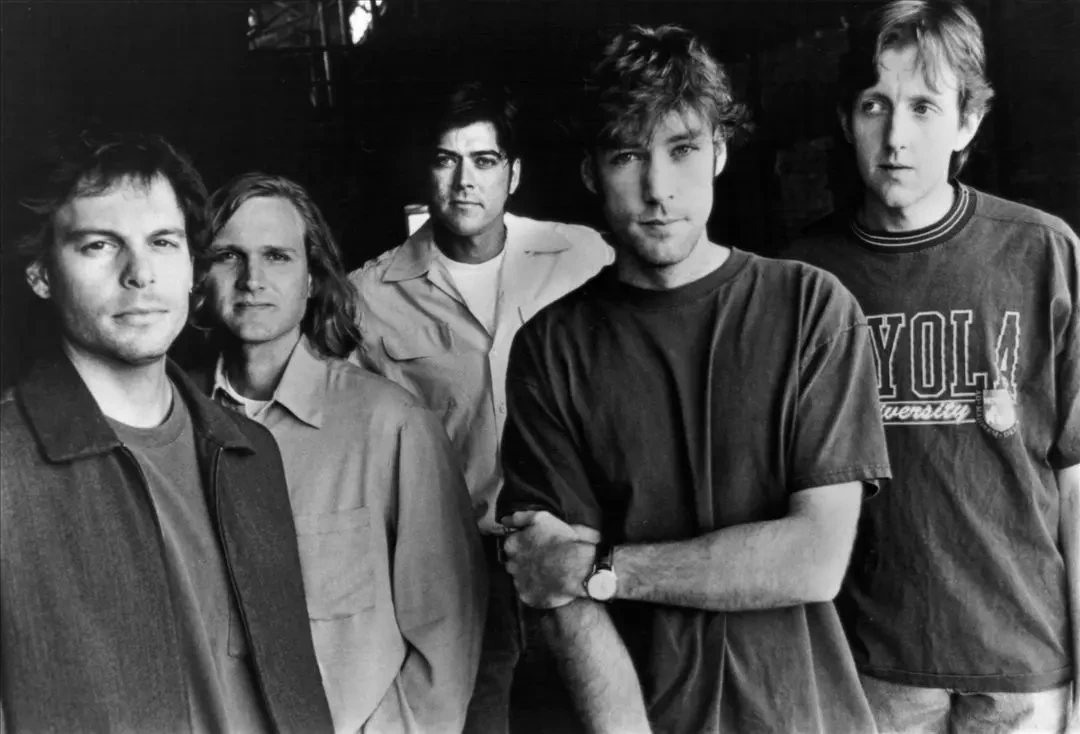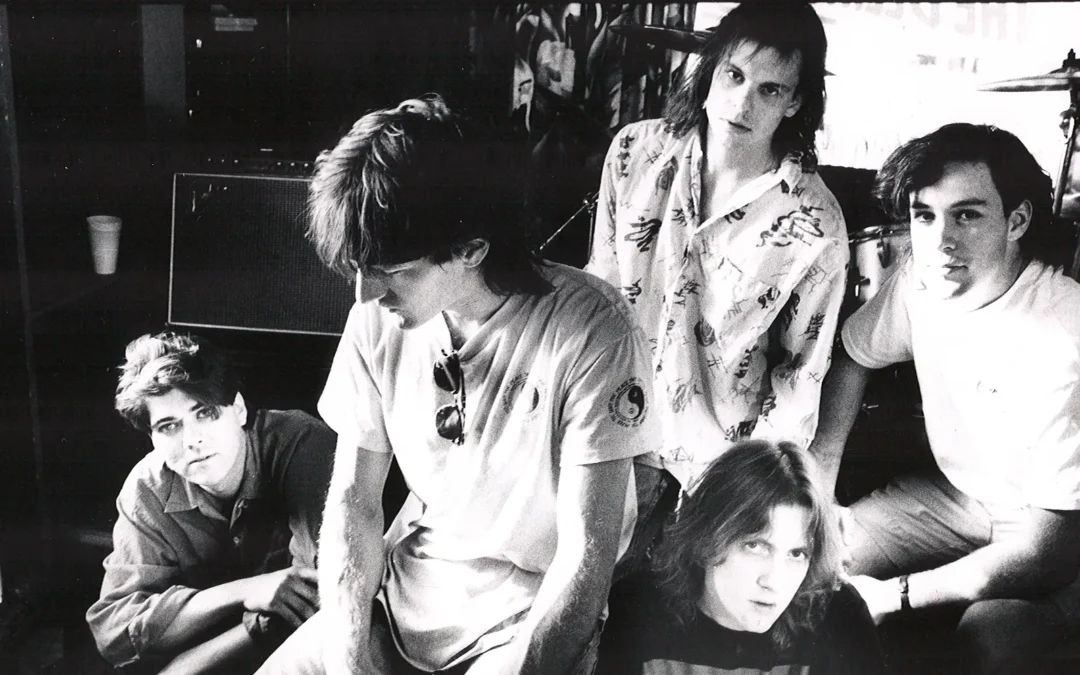
Gin Blossoms: Songs from the Edge — The Doug Hopkins Years and Beyond
When listeners first hear the sparkling intro of “Hey Jealousy,” they’re easily swept away by the upbeat guitar jangle and infectious melody. But at the song’s heart is something far more complicated: a portrait of longing, regret, and fragile hope traced back to one man, the band’s original lead guitarist and chief songwriter, Doug Hopkins.
Hopkins’ story is as essential to the Gin Blossoms as the music. His brief, turbulent tenure in the band gave rise to their biggest hits but ended in tragedy. To understand the Gin Blossoms is to confront both their musical accomplishments and the profoundly personal cost behind them.
I. The Tempe Years: Formation and Discovery (1987–1991)
The Gin Blossoms came together in 1987 in Tempe, Arizona, a college town with a scrappy, eclectic music scene. Their early sound blended jangly guitar pop with bar-band energy. The lineup—Robin Wilson (vocals), Jesse Valenzuela (originally vocals, then lead guitar), Bill Leen (bass), Phillip Rhodes (drums), and Doug Hopkins (guitar, songwriter)—hit its stride through relentless gigging at local venues like Long Wong’s.
Hopkins had a reputation for fierce intelligence and emotional volatility. He studied music theory, wrote obsessively, and was a perfectionist. He also struggled with alcoholism and depression—battles that would define much of his time with the band. Still, his songwriting stood out. Tracks like “Hey Jealousy,” “Found Out About You,” and “Hold Me Down” quickly became staples in the band’s live sets, admired for their melodic precision and lyrical vulnerability.
By 1990, the band had signed with A&M Records. Their first major-label release, the EP Up and Crumbling (1991), hinted at their potential. But pressure from the label—and from within—was mounting.
II. New Miserable Experience: Breakthrough and Breakdown (1992–1993)
In 1992, the band recorded New Miserable Experience. The title, coined by Hopkins, was prescient. During the sessions, his behavior had become increasingly erratic. A&M demanded Hopkins’ firing, fearing that his drinking would derail the project. The band complied. Hopkins is released and replaced by guitarist Scott Johnson. Hopkins is paid $15,000 to sign away some of his publishing rights, a decision he would regret.
Hopkins’ departure didn’t erase his presence. Four of his songs remained on the album, including “Hey Jealousy” and “Found Out About You.” The record slowly gained traction, going multi-platinum and securing the band’s place in early ’90s alternative rock.
III. Dissecting the Songs: Honesty Without Illusion
“Hey, Jealousy” is often misread as a casual pop song. Its lyrics reveal something darker:
“If you don’t expect too much from me, you might not be disappointed.”
This fatalistic and self-aware line underlines the song’s emotional core. Hopkins wasn’t offering redemption—he was pleading for understanding. The song’s upbeat tempo masks its content: a broken man asking for one more night to feel like he matters.
“Found Out About You,” written years earlier, is even more piercing:
“Whispers at the bus stop / I heard about nights out in the schoolyard.”
The song is about betrayal, but not in a theatrical sense—it’s about the everyday, creeping dread of realizing you’re replaceable. The repetition in the chorus—”I found out about you”—feels less like an accusation and more like a self-inflicted wound.
Hopkins’ lyrics didn’t glamorize sadness; they articulated the internal logic of depression with stunning clarity, and that honesty made them resonate.
IV. Aftermath and Legacy: Who Carried the Flame?
Doug Hopkins died by suicide in December 1993, just as the Gin Blossoms were peaking commercially. His loss cast a long shadow, both emotionally and artistically. The band’s follow-up album, Congratulations I’m Sorry (1996), carried that weight in its title alone.
In the years following Hopkins’ death, songwriting responsibilities shifted primarily to Robin Wilson and Jesse Valenzuela. They ushered in a new era with tracks like “Follow You Down” and “As Long As It Matters.” These songs helped the band stay in rotation on both radio and MTV, showing a smoother, more refined edge that leaned into adult alternative territory. There was polish, sure—but there was also a perceptible gap where Hopkins’ messy emotional directness had been.
Wilson and Valenzuela proved themselves thoughtful, capable writers, but their lyrical compass differed. They steered the band toward a softer introspection, sometimes upbeat, sometimes wistful, but rarely as cutting. It wasn’t a diminishment but a transformation—one born of necessity and loss.
V. A Bittersweet Legacy, Clearly Defined
Doug Hopkins left behind more than a handful of great songs—he left a standard for emotional honesty in pop music. His lyrics gave shape to experiences often flattened by radio polish: mental illness, personal failure, and the desire for connection even in moments of self-destruction.
The Gin Blossoms will always be associated with that beautiful contradiction—the sound’s brightness and the words’ sadness. It’s a contradiction that Doug Hopkins understood all too well and one that continues to define the band’s most enduring work.
Allison Road · Gin Blossoms New Miserable Experience ℗ 1992 A&M Records Released on: 1992-01-01 Engineer, Producer, Mixing Engineer: John Hampton Producer: Gin Blossoms Vocalist, Composer Lyricist: Robin Wilson Vocalist: Jesse Valenzuela
Interviewer, “Stereogum” Rachel Brodsky: When you guys were first formulating your now-signature jangle-rock sound, did you actively draw on any influences? For me, I would, I would think of earlier ’80s alternative-rock acts like R.E.M. or even the Smiths or the Feelies.
WILSON: Well, those are great examples. I have records from all three. R.E.M. in particular was a touchstone for us. Doug Hopkins, he was a big fan of the Church. So was I. I thought they have a rather outsized influence on the early Gin Blossoms material that Doug brought in. Songs like “Lost Horizons” and “Found Out About You.” And then, when I got into the band like, my major influence as a songwriter at the time was probably Cheap Trick. We didn’t always consciously go to our references as we were writing songs. But I think those bands had a significant influence on us.
Also, an artist like Marshall Crenshaw, who has since become a friend and collaborator of the band, everyone in the band was a fan of Marshall Crenshaw. A few years back I listened to one of my favorite records from Marshall. It’s called Mary Jean & 9 Others. Just a fantastic record. I hadn’t listened to it in a while, and when I did, I thought, “Oh, this is what I try to sing like. This is how I sing.” I realized when people ask me what my influences are as a singer, I usually say Robin Zander and Freddie Mercury and Michael Stipe. But I came to realize that Marshall Crenshaw actually had a pretty big influence on me as a singer.
Andy Herrin – Drums Grey Wilson – Guitars/Bass Robin Wilson – Vocals/Guitars Mixed by Don Dixon Recorded by Ryan Wall, Ezra Matychek, Chris Neuner Song written by Sarah McLachlan Video directed by Rainer Delalio
Robin and the Last Rites is a side project led by Robin Wilson, the lead vocalist of the Gin Blossoms. While information about the band is limited, it is known that Wilson formed this group to explore musical avenues beyond the Gin Blossoms’ signature alternative rock sound. The project allowed him to delve into different genres and collaborate with various musicians, showcasing his versatility as an artist.
Although Robin and the Last Rites did not achieve the same level of commercial success as the Gin Blossoms, the band holds a special place in Wilson’s musical journey. It provided him with a creative outlet during periods when the Gin Blossoms were on hiatus, and it contributed to his growth as a songwriter and performer.
For fans interested in exploring more of Robin Wilson’s work beyond the Gin Blossoms, seeking out recordings or live performances by Robin and the Last Rites can offer a unique glimpse into his artistic range.
